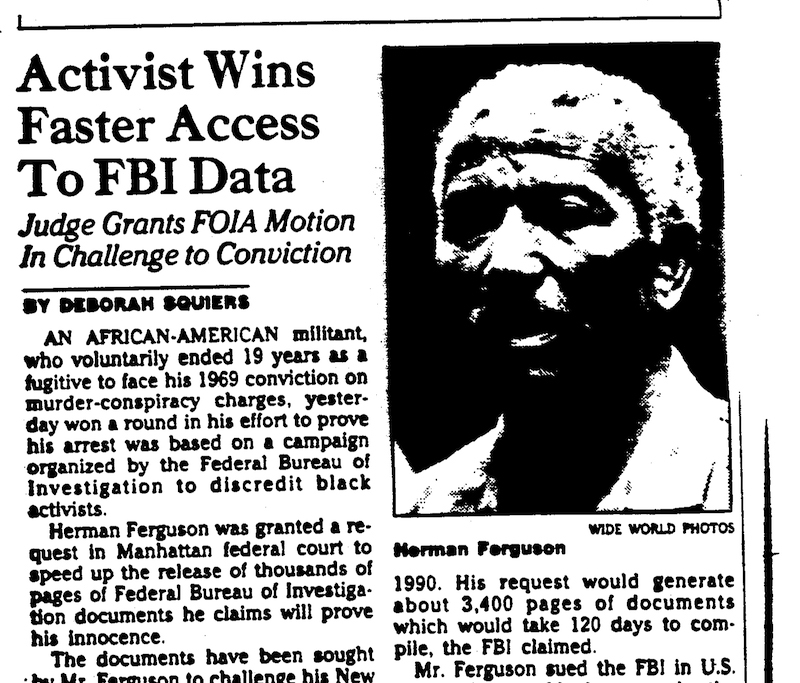Sending your request
We strongly recommend sending your request by both mail and email. Send a request via a mail service like Federal Express, UPS, or the U.S. Postal Service with certified mail, so that you can track delivery and receive documented proof that the request was received by the agency.
Some agencies have forms on their websites that you can fill out to submit your request. We recommend against using these forms, as they may limit your ability to add important details, such as explaining why you should get a fee waiver. Instead, if you are submitting your request electronically, send an email to the agency’s FOIA contact with a copy of your written request attached to an email. Most agencies list FOIA contacts and their email addresses on their websites.
Timelines and dates
It is important to make a note of when responses from agencies are dated and, if you are receiving a response via regular mail, when the envelope is post-marked. In our experience, the dates don’t always match up, and an agency might date a letter October 1, but not mail it until October 10, and it might not get to you until October 15. However, the agency will presume that the clock started running from the date on their letter – October 1 – which might affect your ability to appeal or respond to them.

business days for response

day extension

days for “administrative closure”

days to appeal

days for an agency to respond to your appeal
State laws
State and local laws typically also require the government to respond within a certain period of time, but this differs state to state.
Tracking your correspondence
If you are making a larger request, we recommend keeping track of the responses to your request on a spreadsheet, such as the sample provided here.
You will probably get responses from each of the agencies that you sent your FOIA to, but you may also get responses from sub-parts or offices within those agencies that you are unfamiliar with. It is good to keep a list of each of these responses, when you received each (and when each was postmarked and/or dated), and when and how you responded to them. Not only is it useful for organizational purposes, but it can significantly help or hurt your legal claims if you choose to file a lawsuit later.
Agency responses
You should receive separate responses, at least initially, from each of the agencies you sent your request. Make sure to keep track of each set of responses, because one agency may respond differently than another.
An agency must tell you at which stage it is with your request. If they have begun conducting searches for documents, they should tell you what offices or agency components are being searched and when they began searching. If they find no documents in regards to parts of your request, they must tell you that.
-
1. Initial response (acknowledgment)
Each agency should send back an initial response confirming they received your request and what day they received the request. Often, this response will invoke a 10-day extension for them to respond. You may also receive responses from offices or subcomponents of agencies that you didn’t directly send your request to, but who were forwarded your request by their governing agency. The response should provide a tracking number for your FOIA request as well as a name and address for any follow-up correspondence. -
2. Administrative closure response
Agencies might also respond by saying your request is too “vague” or does not “provide sufficient detail” for them to respond or search for documents, and that they will “close” your request administratively within 30 business days if you do not provide more information or “clarify” your request. We have found that even with very narrow FOIA requests, agencies will sometimes still give this response, which can be frustrating.
Do not re-file your request. Instead, as soon as possible, respond in writing and/or with a call to tell the agency that your request was appropriately detailed and reiterate all the key points of the request. In addition, if anything new has happened between when you filed the request and when you received the response that might be important – like news articles or public events – you can cite to those as well. -
3. Substantive response
After an agency notifies you that they have received your request and are reviewing it, they must respond again within 20 business days of receiving your request and provide information about what is happening with your request. Their response will be different for every request, but it might contain one or a number of these answers:- They might tell you they don’t have the documents you are requesting.
- They might tell you they are searching for the documents you are requesting and will follow up.
- They might tell you they have forwarded your request to another agency or other offices or components of their own agency.
- They should tell you whether they have granted or denied a request for a fee waiver.
- They should tell you whether they have granted or denied a request for expedited processing.

Filing an appeal
If an agency denies any part of your FOIA request, or denies your request for a fee waiver or expedited processing, you can appeal that denial. The agency must provide a contact and instructions on where to direct your appeal.
- You should include all the issues you want to appeal in your appeal letter. For example, if you were denied a fee waiver and also told that DHS does not have the documents you are requesting, write one letter with both appeals. However, you will have to appeal individually to each agency – i.e., you cannot make one appeal to both the FBI and ICE.
- If there is new information that further shows the urgency of your request – recently published articles, for example – include it in your appeal.
- You have 90 days from an agency’s substantive response to appeal to the agency in writing. We recommend you make your appeal as soon as possible, especially if you have requested expedited processing of your request.
- Agencies have 20 days to respond to your appeal. If you have appealed different parts of their response, they may send answers to your appeal at different times.
- It is essential to properly follow the appeals process to “exhaust” your claim if you plan to litigate, in order to have a viable case in court. “Exhaust” means that you have used an agency’s internal procedures and followed its appeal process through its end. When your internal appeal with the agency has ended, you can then go to court.
Be ready for surprises

Tracking the responses, or lack of responses, from government agencies can get confusing. Sometimes agencies will respond quickly, other times they won’t respond at all. Sometimes their answers will be confusing, or they will forward your request to offices you may never have heard of. One component of ICE might grant your fee waiver request and another might deny it.
Don’t let this deter you! It’s often helpful to follow-up with any agency or office that you haven’t gotten a response from - you can ask if they’ve made a determination on part of your request, or whether they sent you the response that you’re missing. Even if you follow-up and never hear back, you can document your attempts to communicate, which can be very helpful when filing an appeal or filing a lawsuit later on. It shows that you are serious about getting the information you request.
Tips on appealing common responses from agencies
If they claim the documents do not exist or are not in control of the agency
If the agency or one of their offices or subcomponents responds saying the documents do not exist or they do not have the documents you are seeking, use as much public information in your appeal as possible to argue otherwise.
For example, there might be an agency official who spoke about what you’re requesting in a recent television interview, so cite to that. Or an agency’s website might describe it having the types of documents you’re looking for – cite to that. Even if you don’t have explicit examples that show the agency’s response is incorrect, make the argument as best you can with as much information as you have.
If they claim they searched and did not find any documents responsive to your request
You can appeal this response using some of the tips above, but, in addition, you can challenge the “adequacy” of the agency’s search. Depending on their request, you can ask why they didn’t search certain offices, subcomponents, or a specific official’s documents who might have the records you are seeking.
You can ask whether they searched certain databases or file systems that you know the agency uses to store their data. A lot of how agencies are structured and store their records can be found on public and government websites, as well as in other FOIAs.
If they claim the documents were not adequately described
If an agency gives you this response, or says that your request was too vague, reiterate why your request is specific and give additional examples that show you know exactly what you’re looking for. Again, citing to public, recently published media is always helpful.
If they claim part or all of your request falls under an “exemption”
This is a very common response. Agencies are allowed to redact information in the documents they provide to you, and must justify their redactions using one or more “exemptions” that we list here.
- If they redact or deny information without telling you which exemptions they are using to support their denial, you can appeal their failure to explain to you their reasons for denying you the information.
- If they deny you information and list the exemptions, you can argue that the exemptions they are using are not applicable to the information you are requesting. This can be a bit trickier and might require looking at the FOIA statute’s language, as well as possibly getting advice from a lawyer, but don’t be scared away from making an argument.